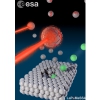Research
Projects

Laser Post-ionization Mass Spectrometer Platform for High Performance Meteorite Analysis, LaPoMaSSA
Chemical composition, surface chemical imaging, and chemical depth profile of space samples are of interest, spanning from meteorites characterization, through space equipment contamination analysis, to astrobiology. Main technical objective is to develop a unique laboratory platform for chemical analysis of solid state space samples. The platform, integrating a secondary ion mass spectrometer and an ultrafast amplified laser system, is proposed to enhance sensitivity of the chemical identification of (micro-) meteorites and surface contamination layers supplied by ESA. The elemental and molecular species are sputtered from the sample surface by the primary ions of mass spectrometer. Since the secondary ions, which are only analyzed, represent only few percent of the sputtered species, the post-ionization can enhance the ion yield. The ultrafast amplified laser post-ionization is proposed with unique infrared pulses which ionize the sputtered neutral surface sample species. The platform of laser post-ionization mass spectrometer can enhance the signal up to two orders of magnitude and will be optimized on proposed samples. The optimization can also utilize an adaptive control with focus on molecular analysis. The post-ionized spectra are proposed to be automatically analyzed by means of machine learning, as main programmatic objective. Effectively achieved object activities will result in a goal of the fully functional laboratory platform. This unique integrated platform with improved parameters will be available for return mission samples and therefore the ESA existing infrastructure would benefit from the access. In addition, the platform will be used for detailed contamination analysis – a recurrent theme for any space mission under development.


